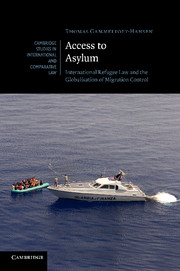Book contents
- Frontmatter
- Contents
- Foreword
- Preface
- Acknowledgements
- Table of treaties and other international instruments
- Table of cases
- 1 Introduction
- 2 The refugee and the globalisation of migration control
- 3 Refugee protection and the reach of the non-refoulement principle
- 4 Offshore migration control and the concept of extraterritorial jurisdiction
- 5 The privatisation of migration control and state responsibility
- 6 ‘Hic abundant leones’: the institutional reach of refugee protection
- 7 Conclusion
- Bibliography
- Index
- CAMBRIDGE STUDIES IN INTERNATIONAL AND COMPARATIVE LAW
4 - Offshore migration control and the concept of extraterritorial jurisdiction
Published online by Cambridge University Press: 03 May 2011
- Frontmatter
- Contents
- Foreword
- Preface
- Acknowledgements
- Table of treaties and other international instruments
- Table of cases
- 1 Introduction
- 2 The refugee and the globalisation of migration control
- 3 Refugee protection and the reach of the non-refoulement principle
- 4 Offshore migration control and the concept of extraterritorial jurisdiction
- 5 The privatisation of migration control and state responsibility
- 6 ‘Hic abundant leones’: the institutional reach of refugee protection
- 7 Conclusion
- Bibliography
- Index
- CAMBRIDGE STUDIES IN INTERNATIONAL AND COMPARATIVE LAW
Summary
It was submitted in the previous chapter that the core protection offered by the 1951 Refugee Convention – the non-refoulement obligation – may be claimed by refugees as soon as they find themselves within a state's jurisdiction. As also has been shown, such an interpretation essentially brings the applicability ratione loci of Article 33 into line with the scope of a number of other human rights instruments. The question is, however, how much is gained by this. While refugee scholars have debated intensely the geographical reach of the non-refoulement principle, few of those arguing in favour of jurisdiction have actually undertaken a systematic analysis of what this concept entails.
A number of refugee scholars seem to assume that any exercise of migration control, whether inside, at or beyond the border, necessarily entails an exercise of jurisdiction. This view, however, finds little support under general international law and current human rights jurisprudence. For the purpose of engaging human rights responsibilities the concept of jurisdiction is generally bound by a premise of effective control over either territory or individuals. Within the territory, this control is assumed to flow from the formal entitlement to exercise sovereign authority. Beyond the territory, however, the test for establishing such control is substantially more demanding. Not all actions undertaken by a state outside its territory appear to bring about jurisdiction. Yet the establishment of jurisdiction is, conversely, the premise for subjecting such states to relevant obligations under international refugee and human rights law.
- Type
- Chapter
- Information
- Access to AsylumInternational Refugee Law and the Globalisation of Migration Control, pp. 100 - 157Publisher: Cambridge University PressPrint publication year: 2011

